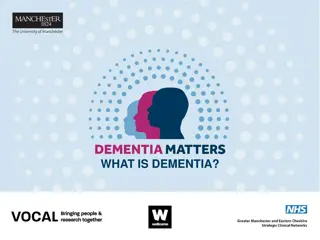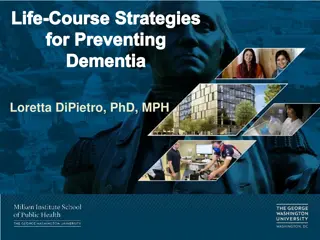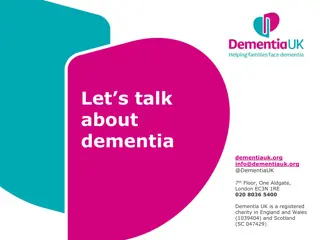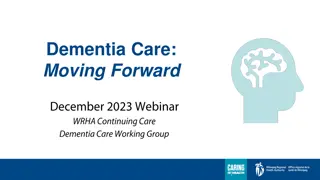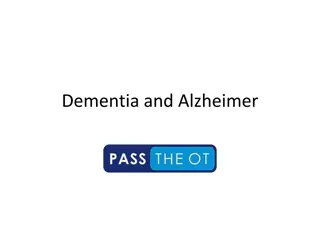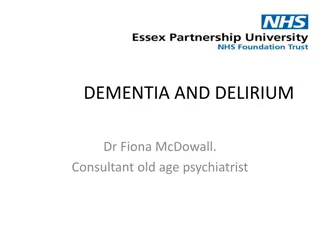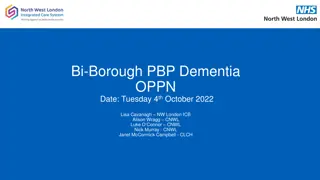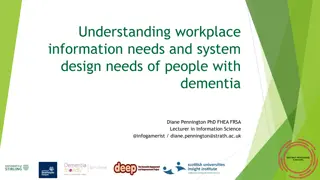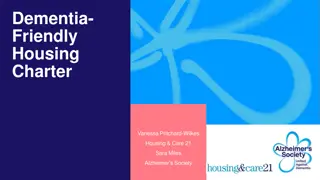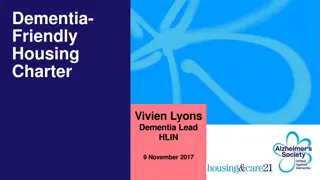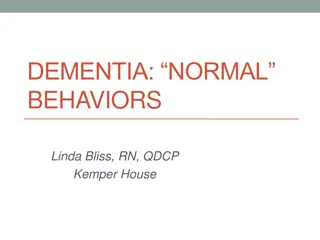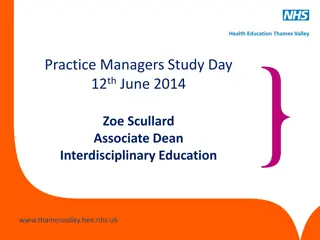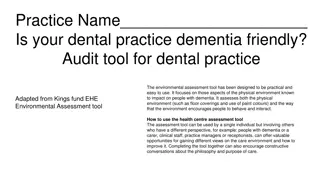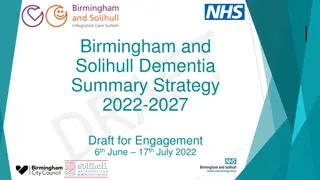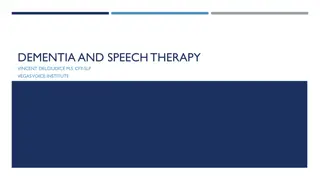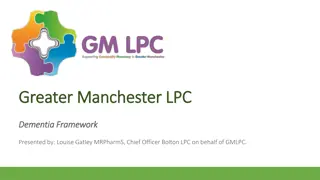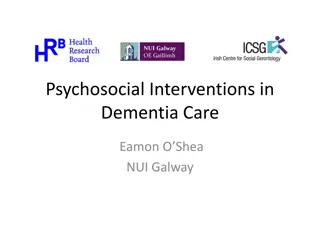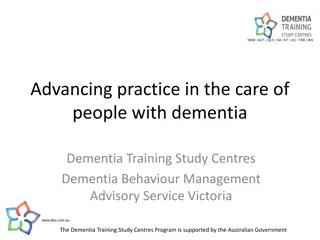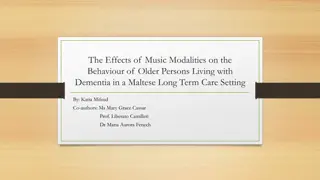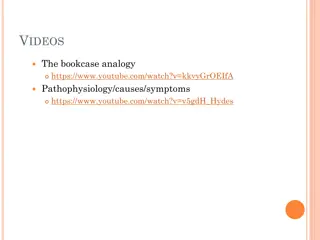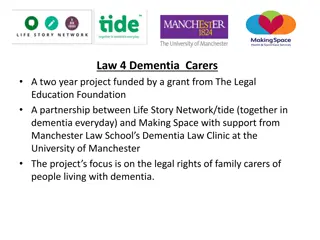Dementia and Learning Disability Training Overview
Explore key learning objectives, classroom agreements, policies, procedures, and an interactive quiz related to dementia and learning disability training. Discover how to offer care and support effectively. Register for the training to enhance your knowledge and skills in this vital area.
Download Presentation

Please find below an Image/Link to download the presentation.
The content on the website is provided AS IS for your information and personal use only. It may not be sold, licensed, or shared on other websites without obtaining consent from the author.If you encounter any issues during the download, it is possible that the publisher has removed the file from their server.
You are allowed to download the files provided on this website for personal or commercial use, subject to the condition that they are used lawfully. All files are the property of their respective owners.
The content on the website is provided AS IS for your information and personal use only. It may not be sold, licensed, or shared on other websites without obtaining consent from the author.
E N D
Presentation Transcript
www.ashhealthcaretraining.com Version 2.1 Slide 22 https://youtu.be/z-Ag8jll5nA Slide 25 https://youtu.be/kkvyGrOEIfA Slide 30 https://www.youtube.com/watch?v=q_sWiwI3yP0&t=7s 3/1/2025 1
Dementia and Learning Disability. 01/03/2025 www.ashhealthcaretraining.com Version 2.1 2
Register Please use scan the QR code opposite or type the link into your phone to complete our registration https://32di.short.gy/dementiaLDpre 01/03/2025 www.ashhealthcaretraining.com Version 2.1 3
Classroom working Agreement Ask Ask questions. Respect and listen Respect and listen to others Raise Raise your hand to speak. Be Be prepared to learn Share Share new ideas. 01/03/2025 www.ashhealthcaretraining.com Version 2.1 4
Learning Objectives Demonstrate Understand Be Demonstrate awareness of Dementia and its impact on people with a learning disability. Understand what approaches can be used to support someone with a learning disability living with Dementia. Be able to offer care and support which enables someone with a learning disability to live well with Dementia. 01/03/2025 www.ashhealthcaretraining.com Version 2.1 5
Policies & Procedures REMEMBER - PLEASE ENSURE THAT YOU FOLLOW YOUR POLICIES AND PROCEDURES AT ALL TIMES. THE ADVICE GIVEN DURING TRAINING IS MEANT TO COMPLIMENT YOUR WORKING PRACTICES, POLICIES AND PROCEDURES AND NOT TO REPLACE THEM. IF IN DOUBT, CHECK WITH YOUR SUPERVISOR. 01/03/2025 www.ashhealthcaretraining.com Version 2.1 6
Activity 1 Quiz! Answer "True or False" to the following questions..... 1. Most old people get Dementia? 2. People with Dementia all show the same symptoms? 3. People with Dementia can experience difficulties with their "Short term" memory? 4. If someone with Downs Syndrome becomes confused or has changes in their behaviour then its Dementia? 5. People living with Dementia often have a good memory for the past? 6. Dementia can be caused by someone having "small stroke's"? 7. You can cure Dementia? How did you do? 01/03/2025 www.ashhealthcaretraining.com Version 2.1 7
www.ashhealthcaretraining.com Version 2.1 Almost 1 million people in the UK Dementia - Current understanding. living with dementia More women with dementia than men. People over 65 are much more likely to get dementia, but it can affect younger people too (under 65yrs). 01/03/2025 8
www.ashhealthcaretraining.com Version 2.1 Dementia - Prevalence (It's not just older people!) 01/03/2025 9
www.ashhealthcaretraining.com Version 2.1 The acquired global impairment of What is higher cortical functions, including memory, the capacity to solve problems of day to day "Dementia!". living, performance of learned perceptuomotor skills, the correct use of social skills, all aspects of language and communication, and the control of emotional reactions in the absence of gross clouding of consciousness WHO (1986) That make's perfect sense........doesn't it? 01/03/2025 10
www.ashhealthcaretraining.com Version 2.1 Brain Tour impact of Dementia. 01/03/2025 11
www.ashhealthcaretraining.com Version 2.1 Dementia it's "Journey". 01/03/2025 12
www.ashhealthcaretraining.com Version 2.1 GP Simple assessment. Other tests such as physical tests May refer to a specialist team for further assessments. BUT? What about people with a learning disability? Is it different for them? Dementia - Assessment 01/03/2025 13
www.ashhealthcaretraining.com Version 2.1 Identify / treat reversible causes Enable the person, and those around them to plan their future. Gain support and education. Making adaptations. Treatment. Value of an Early Diagnosis! 01/03/2025 14
www.ashhealthcaretraining.com Version 2.1 Both people with learning disabilities and people with mental health problems experience diagnostic overshadowing . Diagnostic Overshadowing! 01/03/2025 15
www.ashhealthcaretraining.com Version 2.1 Mental Illness Vitamin deficiency Hyperglycaemia Thyroid conditions Sleep deprivation Constipation Urinary tract infections Pain What else could it be? Any of these could Mimic the signs of Dementia, so they NEED to be ruled out! 01/03/2025 16
www.ashhealthcaretraining.com Version 2.1 What else could it be? 3/1/2025 17
www.ashhealthcaretraining.com Version 2.1 Delirium Consider the PINCHME approach to recognising Delirium. 01/03/2025 18
www.ashhealthcaretraining.com Version 2.1 Dementia can affect "Anyone" Anyone can develop Dementia! Do you know anyone "Famous" who has or had Dementia? 01/03/2025 19
Activity 3 What "Types" of "Dementia!" In your small groups; Name the differing types of Dementia. How many can you get? How many do you think there are? What is the most common type? Do you know someone who is "Living with Dementia"? 01/03/2025 www.ashhealthcaretraining.com Version 2.1 20
Alzheimers Vascular Fronto-temporal Lewy Bodies Mixed Parkinson s HIV/AIDS related Creutzfelt Jacob Disease (CJD) Other - how many do you think there are? Types of Dementia 01/03/2025 www.ashhealthcaretraining.com Version 2.1 21
www.ashhealthcaretraining.com Version 2.1 01/03/2025 22
"Dementia" is an Umbrella term. 01/03/2025 www.ashhealthcaretraining.com Version 2.1 23
www.ashhealthcaretraining.com Version 2.1 Dementia signs and symptoms. Just Memory Loss Isn t it? 01/03/2025 24
Memory Loss Bookcase Analogy 01/03/2025 www.ashhealthcaretraining.com Version 2.1 25
www.ashhealthcaretraining.com Version 2.1 01/03/2025 26
Memory Loss Bookcase Analogy What memories do the people you support may have? Where on the bookcase are these memories? 01/03/2025 www.ashhealthcaretraining.com Version 2.1 27
Other Dementia UK suggests early signs of Dementia can be seen in relation to; Memory Cognitive ability Communication changes. Experiencing these changes can be scary, frustrating and lead to low mood. For people with a learning disability this may also include changes in their behaviour, such as increases in distress. symptoms of Dementia. 01/03/2025 www.ashhealthcaretraining.com Version 2.1 28
Activity 3 Planning Support. What do you think might be the important things to consider when supporting someone with a learning disability and Dementia? In groups consider what care approaches you would need to consider? 01/03/2025 www.ashhealthcaretraining.com Version 2.1 29
www.ashhealthcaretraining.com Version 2.1 01/03/2025 30
www.ashhealthcaretraining.com Version 2.1 Living With Dementia Supporting someone is not about Taking things away from them, but enabling the person to Keep what skills they have. Through My Eyes! People with Dementia can learn, but may not be able to Hold that learning. 01/03/2025 31
www.ashhealthcaretraining.com Version 2.1 Supporting me Living with Dementia - Communication Being prepared to offer support ; Communication with people with the most complex needs is most successful with familiar, responsive partners who care about the person they are communicating with. 01/03/2025 32
www.ashhealthcaretraining.com Version 2.1 Diana Kerr identified that for people with a learning disability their were 5 Objectives of Support; Calm Predictable Familiar Suitably stimulating Make sense Objectives of Support (Kerr, 2007) 01/03/2025 33
www.ashhealthcaretraining.com Version 2.1 Health Needs Assessment Health Action Plans Life Stories Person Centred Plans Behavioural Assessments Pain Management. Environmental assessment. Medication Reviews Capacity assessments Communication assessments. Living Well with Dementia People with a learning disability. 01/03/2025 34
www.ashhealthcaretraining.com Version 2.1 Sometimes those around the person, family, friends, housemates, peers, need to be supported to understand how a person s journey may impact. Jenny s Diary was designed to offer support in this. Living Well with Dementia Supporting those around me!. 01/03/2025 35
www.ashhealthcaretraining.com Version 2.1 Jenny s Diary https://ashhct.link/Jenny'sdiary IT SHOWS THAT GEORGE & JENNY CAN STILL HAVE A RELATIONSHIP EVEN THOUGH JENNY HAS BEEN DIAGNOSED WITH DEMENTIA' 01/03/2025 36
www.ashhealthcaretraining.com Version 2.1 Conclusion - 01/03/2025 37
www.ashhealthcaretraining.com Version 2.1 Conclusion - Early diagnosis is key Remember!!!!! See the Person NOT the Dementia. 01/03/2025 38
Useful resources Dementia and Learning Disability htthttps://www.alzheimers.org.uk/about- dementia/types-dementia/learning-disabilities- dementiaps://www.ndti.org.uk/assets/files/NDTi- BILD_Supporting_Older_People_Toolkit_2014.pdf https://www.scie.org.uk/dementia/living-with- dementia/learning-disabilities/isability https://www.gov.uk/government/publications/peo ple-with-dementia-and-learning-disabilities- reasonable-adjustments/dementia-and-people- with-learning-disabilities 01/03/2025 www.ashhealthcaretraining.com Version 2.1 39
www.ashhealthcaretraining.com Version 2.1 Feedback Please type the link into your browser to complete your feedback: https://ashhct.link/dementiaLDf eedback Or scan the QR code opposite: 01/03/2025 40


